Time is nobody’s friend. Authors in particular can fall afoul of time—all it takes is a few years out of the limelight. Publishers will let their books fall out of print; readers will forget about them. Replace “years” with “decades” and authors can become very obscure indeed.
The Cordwainer Smith Rediscovery Award was founded in 2001 to draw attention to unjustly forgotten SF authors. It is a juried award; the founding judges were Gardner Dozois, Robert Silverberg, Scott Edelman, and John Clute. The current judges are Ann VanderMeer, Richard Horton, Steven H Silver, and Grant Thiessen. Since it’s been five years (and there have been four new recipients1) since we last discussed the award in 2018, I’ve updated the discussion to include the newest honorees—including the most recent winner, announced this past weekend at Readercon.
I wish the award were more widely known, that it had, perhaps, its own anthology. If it did, it might look a bit like this. Who are the winners? Why should you care about them? I am so happy I pretended you asked. In order of victory, from 2001 to 2023:
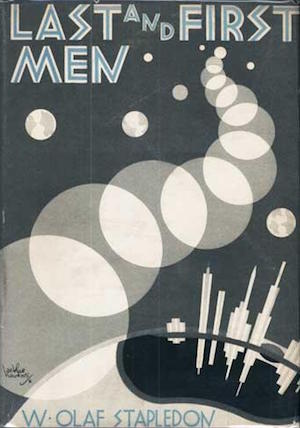
Olaf Stapledon (10 May 1886–6 September 1950) could write narrow focus novels when he wanted to. Sirius, for example, focuses on the life of an intelligent dog, while Odd John is the biography of a super-genius in a world that’s not ready for him. But Stapledon excelled at the epic: wide-focus visions of the past and future. Last and First Men covers the history of eighteen distinct human species over two billion years. Star Maker is even more ambitious; it narrates a history of the universe.
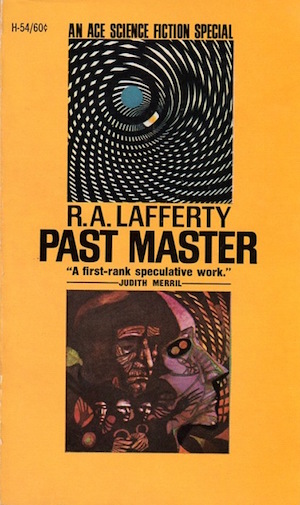
R.A. Lafferty (November 7, 1914–March 18, 2002) was not all that interested in plot. He excelled at setting and literary style. He’s not to everyone’s taste, but those who enjoy Lafferty’s work enjoy it intensely. Lafferty was sidelined by a long illness, during which time he was close to forgotten. In recent years publishers from Wildside to Centipede Press have brought his work back into print.
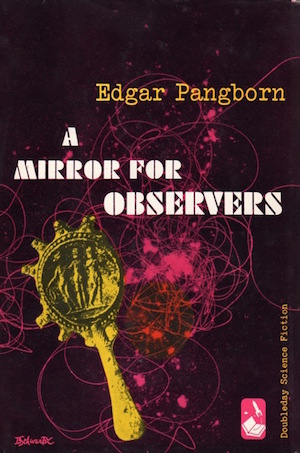
Edgar Pangborn (February 25, 1909–February 1, 1976) was active as a mystery writer for twenty years before he turned to science fiction in the 1950s. His humanist science fiction won fan acclaim. His novel A Mirror for Observers won the 1954 International Fantasy Award. Many of his later pieces form the Tales of a Darkening World sequence, set after war, plague, and climate change have reduced humanity to a tiny, barbaric remnant of today’s civilization. 1964’s Davy may be the best known in the series2; I prefer the melancholy collection Still I Persist in Wondering. If read in publication order, Tales of a Darkening World betrays Pangborn’s increasingly pessimistic view of humans. Some early pieces are available on Gutenberg. SF Gateway’s Edgar Pangborn Omnibus is also in print.
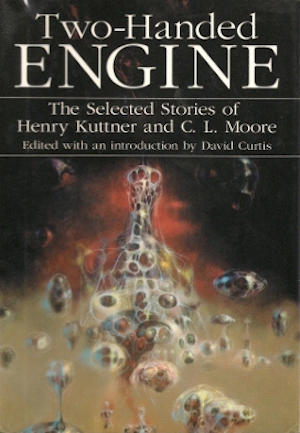
Henry Kuttner (April 7, 1915–February 3, 1958) and C. L. Moore (January 24, 1911–April 4, 1987) were both well-known authors before their mutual friend Howard Lovecraft introduced them. Once they married, they were a powerhouse writing team. Because they often collaborated, and because they sold the resulting works under whichever of their many bylines seemed most suitable, due credit for specific pieces can be difficult to establish. Thus it makes perfect sense to give them a joint award. My personal favourite of their collections is Two-Handed Engine, but it seems to be out of print. Look for the reprints of The Best of Henry Kuttner and The Best of C. L. Moore.
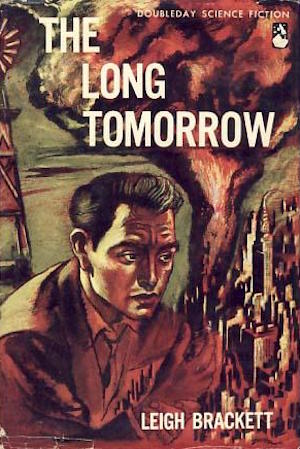
Leigh Brackett (December 7, 1915–March 18, 1978) was lauded for her planetary adventures (she moved her Eric John Stark adventures to the extra-solar world Skaith when space probes rendered her pulp-era Solar System implausible) but that was only one aspect of her work. In addition to writing SF and mysteries, she was a successful script writer. Her credits include The Big Sleep, Rio Bravo, The Long Goodbye, and an obscure little film called The Empire Strikes Back. Her planetary adventures tended to be long on action and short on clear moral boundaries. I am particularly fond of her post-apocalyptic The Long Tomorrow. Readers interested in her planetary adventures should look for the recent reprints of The Ginger Star, The Hounds of Skaith, and The Reavers of Skaith.
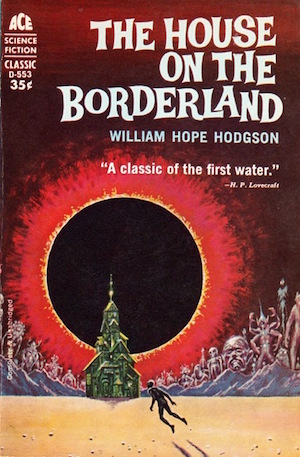
William Hope Hodgson (15 November 1877–19 April 1918) predated today’s formalized genre boundaries. One might think of him as working somewhere in the intersection of weird fantasy and cosmic horror. His best known works are the dying-Earth horror novel The Night Land and the hallucinatory The House on the Borderland. You may never have read either, but odds are you’ve read works influenced by one or the other. Hodgson died at Ypres, during WWI3; hence several of his works are public domain and available at Project Gutenberg.
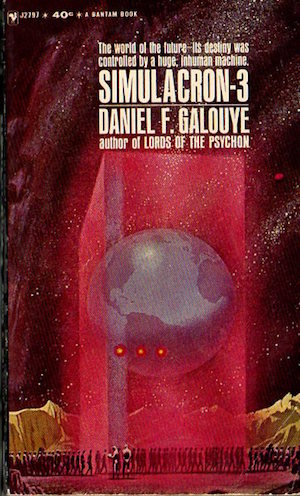
Daniel F. Galouye (11 February 1920–7 September 1976) was a journalist until health issues forced his retirement. He was prolific. Many of his stories feature protagonists with unrealized potential and nowhere near enough information about their circumstances. His Counterfeit World AKA Simulacron-3 (filmed as The 13th Floor) seems the obvious starting point. A few of his works are available at Gutenberg.
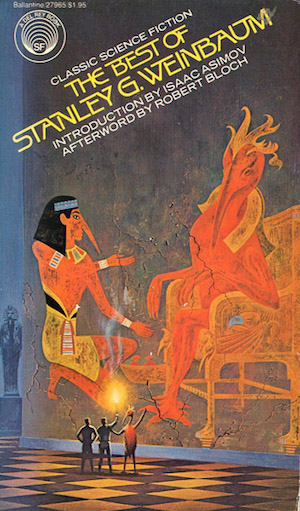
Stanley G. Weinbaum (April 4, 1902–December 14, 1935) died of cancer only eighteen months after his debut story A Martian Odyssey saw print. Although he dabbled in super-science, he seems to have by and large played fair with his readers. His oeuvre may be as close to hard SF as one might find in the 1930s. I recommend the ebook reprint of The Best of Stanley G. Weinbaum.
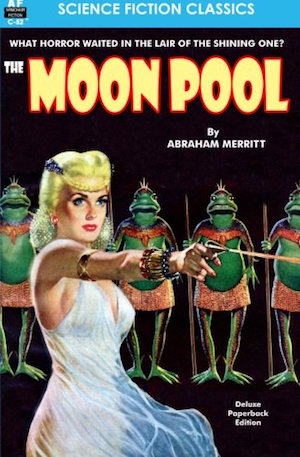
A. Merritt (January 20, 1884–August 21, 1943) found time during his active journalism career to pen eight science fantasy novels and an assortment of short stories. Readers curious about his vivid alternate worlds and, um, energetic prose could start with his classic The Moon Pool, available on Gutenberg.
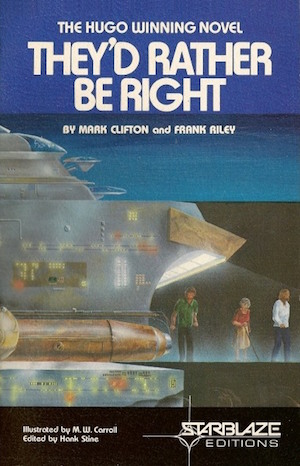
Industrial psychologist Mark Clifton (? 1906–November 1963) may be best known for winning the second Best Novel Hugo for They’d Rather Be Right, of which the less said the better. Much of his output focused on either the supercomputer Bossy (wise but distrusted by humans) and the Ralph Kennedy psionic tales. The story I’d suggest to anyone whom I didn’t actively dislike is the sentimental “Star, Bright,” whose view of super-kids is charmingly unhorrific. If you’ve annoyed me recently, then by all means track down They’d Rather Be Right.
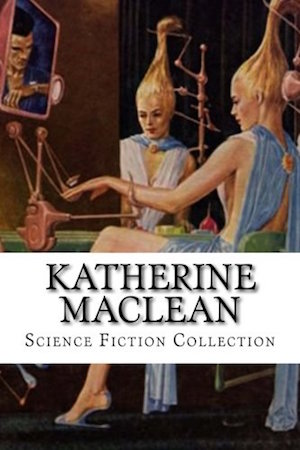
Although Katherine MacLean (January 22, 1925–September 1, 2019) also wrote novels, it was an early flurry of short pieces (most published in the 1950s) that drew her to SF readers’ attention. Stories of particular note include “The Snowball Effect,” about sociological research that proves all too successful, “Pictures Don’t Lie,” about believing one’s eyes, and “And Be Merry,” in which a woman struggles with the terrors of immortality. There are many other MacLean stories worth reading. MacLean was the first author to win the Rediscovery while still living, though she passed away in 2019.
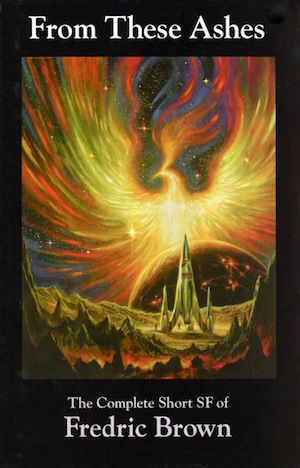
Fredric Brown (October 29, 1906–March 11, 1972) was, as previously discussed, a master of the short-short story, although he hardly restricted himself to that form. Readers interested in his novel-length material could look for his alternate universe comedy What Mad Universe, although I would lean more towards suggesting NESFA’s From These Ashes: The Complete Short Science Fiction of Fredric Brown.
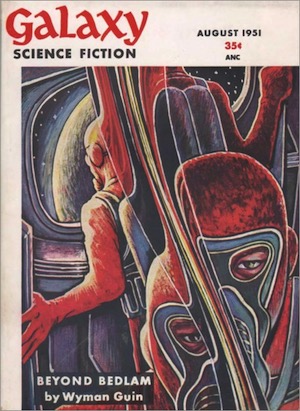
Wyman Guin (March 1, 1915–February 19, 1989) is one of two authors who have won the Rediscovery whose work I have not managed to track down. Aside from his association with Galaxy Magazine, I know little about his fiction. Alas, he seems to be very, very thoroughly out of print.
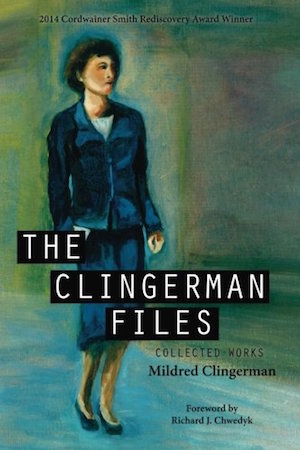
Mildred Clingerman (March 14, 1918–February 26, 1997) is the other author in whose work I am not widely read. It’s not for lack of trying, because I’ve seen her work referenced favourably over the years. But! In the interval between writing my review of the Rediscovery Award Anthology I wish existed and composing this essay, The Clingerman Files was published. Not only does it contain her previously published work, it also includes some pieces previously unpublished. A copy is even now headed my way.
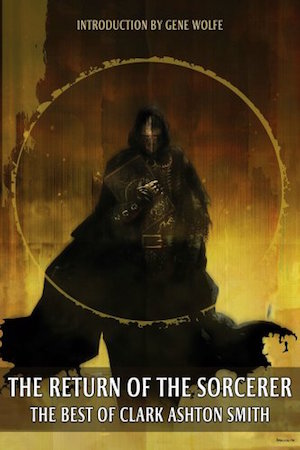
Clark Ashton Smith (January 13, 1893–August 14, 1961) was a mainstay of Weird Tales in the era of Lovecraft, Howard, and cover artist Margaret Brundage. Smith’s vivid, gleefully morbid tales featured protagonists not destined for long lives. But then, who would expect longevity for characters who proclaim
I am now at work on an apparatus by means of which, when it is perfected, I hope to manifest in their essential purity the radiations of malign force.
I can see no way in which that could go horribly wrong…
Readers new to Smith might consider Prime’s The Return of the Sorcerer.
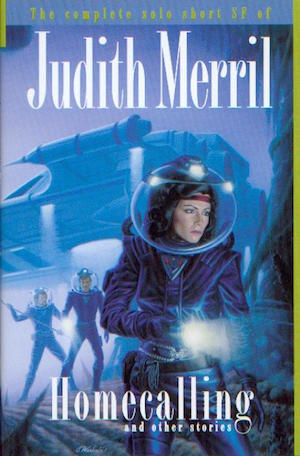
Writer, editor and activist Judith Merril (January 21, 1923–September 12, 1997) was a member of the Futurians, a fellowship of writers, editors, artists, and fans whose collective efforts guided science fiction away from Campbell’s narrow vision. Her noteworthy fiction includes the disturbing “That Only a Mother,” the co-written military SF novel Gunner Cade, and the post-holocaust Shadow on the Hearth. Readers new to Merril should look for a copy of Homecalling and Other Stories: The Complete Solo Short SF of Judith Merril.
Despite her accomplishments as a writer, it’s her role as an editor for which Merril is best known. Her variously titled The Year’s Greatest Science Fiction and Fantasy/Annual of the Year’s Best S-F ran from 1957 to 1968, followed by two Best of the Best volumes in 1970. Although there have been many Best SF annuals, Merril’s stood out for the breadth of the net she cast, drawing stories from well outside the usual borders of science fiction. She is to date the only woman to helm a best SF annual solo.4
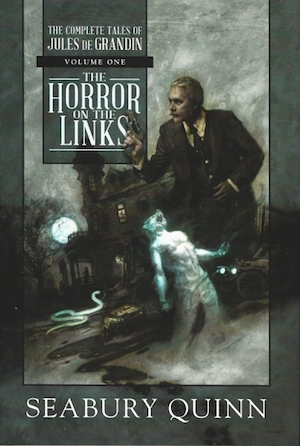
Seabury Quinn (January 1, 1889–December 24, 1969), first published in 1917, was a prolific contributor to Weird Tales (a magazine of which the judges for this award appear quite fond). Occult detective Jules de Grandin featured in many of them, enough to fill all three volumes of The Complete Tales of Jules de Grandin (Horror on the Links, The Devil’s Rosary, and The Dark Angel.).
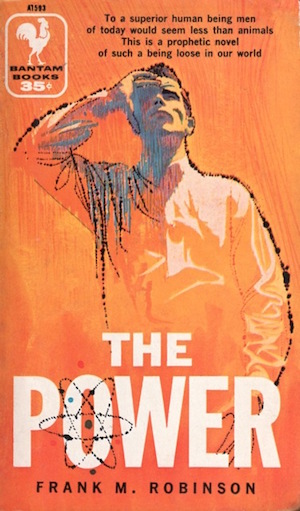
Activist Frank M. Robinson (August 9, 1926–June 30, 2014) in no way limited himself to writing fiction (his political activities won him a spot in the Chicago Gay and Lesbian Hall of Fame). Even his role in SF was wide-ranging… and long-lived. His sixteen novels ranged from psionic thriller The Power to the generation ship Bildungsroman The Dark Beyond the Stars. With Thomas Scortia he was author of several successful thrillers, ranging from The Glass Inferno (which contributed to the ensemble disaster film The Towering Inferno), The Prometheus Crisis, The Nightmare Factor, and The Gold Crew.
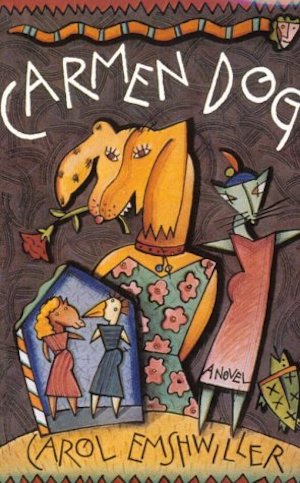
Carol Emshwiller (1921–2019) published her first story, “This Thing Called Love,” in 1955. She went to enjoy an unusually long and notably prolific career. While Emshwiller did write non-genre works, her primary focus was speculative fiction. There are to my knowledge only six Emshwiller novels: Carmen Dog (1988), The Mount (2002), Mister Boots (2005), The Secret City (2007), and the two non-genre Ledoyt Family novels, Ledoyt (1995) and Leaping Man Hill (1998). However, she produced an abundance of short fiction.
If not actually New Wave, Emshwiller was quite New Wave-adjacent. She eschewed conventional tropes and demanded effort from her readers. Readers, and jurors, rewarded her for aiming high. She won Nebula, World Fantasy, and Philip K. Dick Awards, among others.
Readers unfamiliar with Carol Emshwiller’s fiction might want to read The Collected Stories of Carol Emshwiller Volume 1 (2011) and The Collected Stories of Carol Emshwiller Volume 2 (2016), which (as you may have guessed from the title) is a two-volume set collecting Emshwiller’s short works. The 1206 pages of the set collect many enjoyable stories and include a foreword from the author herself.
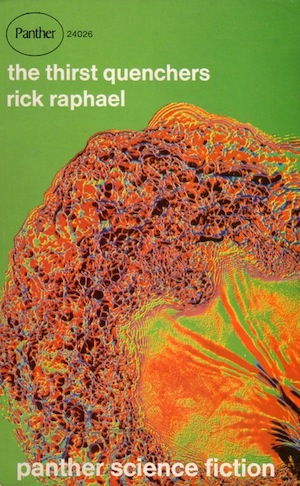
Rick Raphael (1919–1994) won the award in 2020. Raphael is in many ways the antithesis of Emshwiller. Where she leaned New Wave, Raphael embraced a more conventional approach. Unsurprisingly, Raphael’s work appeared predominantly in John W. Campbell Jr’s Astounding/Analog.5 Unlike Emshwiller, Raphael was not prolific. He may be the Cordwainer Smith Rediscovery Award winner with the smallest body of work: the ISFBD lists a novel, Code Three, the collection The Thirst Quenchers, and about ten short stories.
On the plus side, a small body of work makes it much easier to select a representative example. In this case, seek out Code Three, an exuberant tale of near-the-speed-of-sound law enforcement on the super-highways of an imagined future America. Not only does this book show off Raphael’s undeniable talents, it is easily available, either as a free ebook here or (alongside many other vintage works) in Jim Baen, David Drake, and Eric Flint’s retrospective SF tome The World Turned Upside Down.
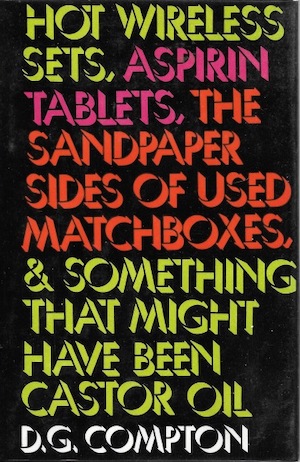
David Guy Compton, best known as D. G. Compton, (born 1930) was 2021’s recipient. Like Emshwiller, Compton was prolific across a variety of genres, his first novel being not SF but rather mystery (1962’s Too Many Murderers). Unlike either Emshwiller or Raphael, or for that matter most Cordwainer Smith Rediscovery Award recipients, Compton is still alive. Perhaps there are new works still to come.
Compton views human proclivities with an unflinching insight that in many authors reveals itself in bitter satire. Compton is less bitter, more serious. He has explored the various futures to which human ambition might deliver us. Many of those futures we would be well advised to avoid.
While it is hard to resist the appeal of a title like Hot Wireless Sets, Aspirin Tablets, the Sandpaper Sides of Used Matches, and Something That Might Have Been Castor Oil6, the work that readers unfamiliar with Compton would be well advised to read would be The Continuous Katherine Mortenhoe AKA The Unsleeping Eye AKA Death Watch, available from a variety of sources. Terminally ill Katherine Mortenhoe becomes the focus of a journalistic probe, one that is commercial rather than high-minded. Her final weeks are to be recorded and transmitted for the voyeuristic delectation of bored viewers.
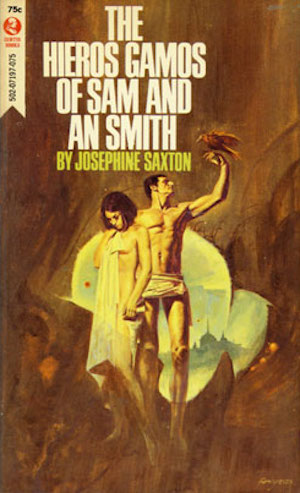
2023’s Cordwainer Smith Rediscovery Award winner is Josephine Saxton. (born 1935). Saxton’s work defies easy categorization. It’s not clear whether many of the events experienced by her protagonists were actually real or whether they were merely allegorical reflections of protagonist’s mental states. What is abundantly clear is that the author wrote from a relentlessly feminist standpoint.
While Saxton has not been an especially prolific author (at least not by the standards of your Brunners or Silverbergs), her name would have been quite familiar to readers circa 1960–1980. Her works appeared in anthologies such as Orbit, Women of Wonder, and Amazons!
After 1990 Saxton published infrequently. However, much of her older work remains available. In particular, the collections The Travails of Jane Saint and Other Stories, Little Tours of Hell, Jane Saint and the Backlash, The Power of Time, and the novel The Hieros Gamos of Sam and An Smith are available in ebook editions.
***
That brings us up to the present day! Who will be the next winner of this award? Not being a judge, I couldn’t say. But I am very curious to find out. Please feel free to suggest possible candidates (or discuss favorite works by any other authors mentioned above) in comments below.
An earlier version of this article was originally published in September 2018.
In the words of fanfiction author Musty181, four-time Hugo finalist, prolific book reviewer, and perennial Darwin Award nominee James Davis Nicoll “looks like a default mii with glasses.” His work has appeared in Interzone, Publishers Weekly and Romantic Times as well as on his own websites, James Nicoll Reviews (where he is assisted by editor Karen Lofstrom and web person Adrienne L. Travis) and the 2021, 2022, and 2023 Aurora Award finalist Young People Read Old SFF (where he is assisted by web person Adrienne L. Travis). His Patreon can be found here.
[1]Note: There was no award in 2022 due to the pandemic. Unfortunately the Cordwainer Smith Foundation site stopped updating their list of Rediscovery winners in 2012 (although Wikipedia keeps a list), because, if I understand a recent email exchange correctly, they thought File 770 was preserving information about the award. While File 770 does report on the award (and is where I got the list of judges), this is simply part of their general news reporting activities.
[2]Readers may find the 1976 Vallejo cover a bit risqué. Surprisingly enough, it is true to the text—save for one detail. Davy is wearing cut-offs. In his time, such tailored trousers are a lost technology. Consider how much technology had to be lost for that to be true.
[3]A fair fraction of Rediscovery winners enjoyed short lives, whether thanks to the lingering (or in the case of Hodgson, immediate) effects of military careers or to simple bad health.
[4]Paula Guran has published two Best-of anthologies that cover both SF and fantasy (http://www.isfdb.org/cgi-bin/ea.cgi?10799). Forty-seven years passed between Merril’s final Best-of and Guran’s first.
[5]After Campbell died, Raphael became less prolific. It may be that Raphael found his best fit with just one editor and one venue. Which other once notable authors, now obscure, deserve to have the spotlight cast upon them? I have some ideas, which I might present at a future time, but for now, feel free to name and defend your selections in comments below.
[6]Often publishing under the considerably less awesome title “Chronocules”










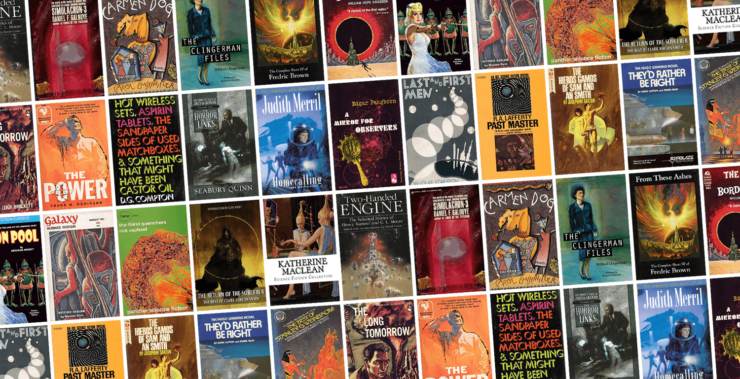
For the love of all that is holy, will someone please nominate Raymond Z. Gallun? One of the best of his time and his stories remain far less dated than some of the honorees here.
Oh man, I remember The Dark Beyond The Stars! One of the wilder reading experiences of my adolescence.
A couple of the earlier entries should probably be updated — Katherine MacLean of course is no longer the only person given the award while alive — both Compton and Saxton are still alive. And MacLean is, alas, no longer eligible for the Grand Master, as she died in 2019.
One could create a list of Cordwainer Smith winners who really deserved to be named Grand Master — C. L. Moore, of course, was apparently chosen, but her family declined as she had Alzheimer’s at the time. Carol Emshwiller absolutely should have been a Grand Master. I suspect Brackett probably would have been named a Grand Master had she lived a couple more years. And you could make a strong case for Judith Merril, especially considering her contributions as an editor, and her contributions to Canada’s SF community.
As for Wyman Guin — like Rick Raphael, his output was quite small. Unlike Rick Raphael, he wrote a true classic, one of the best novellas in SF history in my opinion: “Beyond Bedlam”. That’s the Guin story to seek out!
Finally — new work from winners of the award. D. G. Compton* has written a semi-autobiographical novel, not SF, called So Here’s Our Leo. It was published in 2022 and is available from Wildside Press. And Josephine Saxton has written at least one recent SF story, from which Ann VanderMeer read an excerpt at the award presentation this year. If Saxton is willing, Ann will publish it somewhere (maybe at this very site?) soon.
*(D. G. Compton tells me he’d rather nobody read his mysteries (written as by “Guy Compton”) because he doesn’t think they are very good. But he’s happy if you read his Romance novels, written as by “Frances Lynch”.)
@1) As for nominations, there is no formal process. But any of us on the jury will be happy to hear suggestions. And, actually, somebody mentioned Raymond Z. Gallun to me at Readercon this year! I have read some of his work and I agree that it holds up better than most writers of his generation.
—
Rich Horton
@3: Thanks–we’ve updated that section; apologies for the oversight!
Well, ecbatan has covered the need for a rewrite of the Katherine MacLean entry @3.
Someone I think should be considered is Mack Reynolds. He has some of the flaws of somebody who broke into the genre in the 1950s and never really moved into newer forms of storytelling as the New Wave came and ebbed, but he had the ability to write about economics and make it interesting. He also had the incredible ability to get John Campbell to print left-leaning stories. If nothing else, he’s a better writer than Rick Raphael. Just don’t read any story he wrote that involves Native Americans.
6: I think Reynold’s … I think “extreme bigotry toward Native Americans” is the nicest possible term for it… might have been a good part of how MR appealed to JWC. It can be hard to avoid in his fiction. For example, he managed to insert it into the North Africa series.
It should be pointed out that Fredric Brown was even more prolific as a writer of crime, mystery and psychological thriller novels, such as “Night of the Jabberwock,” “The Far Cry,” “Madball, and “The Fabulous Clipjoint.” He had a flair for writing about psychologically damaged people, and some of them are borderline supernatural.
He also sometimes experimented with narrative techniques, such as in “Here Comes a Candle,” in which some chapters are written in the form of a radio play, a drama, and even a sports broadcast (describing a small-time crook robbing a gas station). And in “The Lenient Beast,” the chapters are in alternating first-person narration among the principal characters (including the murderer).
1: As I recall, the Del Rey Best of Raymond Z. Gallun was one of the few books in that series I never saw (along with the Brunner). My intro to him was probably Old Faithful, which was in Asimov’s Before the Golden Age.
Are there any Gallum books in print that are not reprints of public domain works?
Come to think of it, Judy-Lynn del Rey had a huge effect on the field and would be an obvious candidate… except as far as I know she kept to the backstage except for her rather unimpressive Stellar series.
The Rediscovery of Man, The Complete Short Science Fiction of Cordwainer Smith, published by NESFA Press, is an excellent introduction to Cordwainer Smith’s science fiction. His one SF novel, Norstrilia, is also good. Cordwainer Smith was the inspiration for the Rediscovery Award and could be considered to be the zeroth recipient.
I’d love to know how one establishes that an author has been forgot, because I only think of those authors I remember. Surely, if I know about an author, everyone does?
A couple of decades ago, I’d have suggested Clifford D. Simak but I see he has a whole series of collections out now.
Let’s see, who do I think could use a spotlight on their work? People who remember Alison Tellure’s work at all seem to remember it fondly. Ditto Susan C. Petrey. However, in both cases their body of work was very small.
Ross Rocklynne epitomized a certain flavour of hard SF and he did manage to win a spot in a Dangerous Visions antho. However, the particular flavour of hard SF he wrote was the sort where you can learn a lot working how why things don’t work as he has them work in his story. Also his prose, uh, did not notably advance the state of the art in the pulps.
I had thought Charles R. Saunders was widely known and respected, but then he ended up in an unmarked grave, necessitating a fundraiser for a head stone.
Doris Piserchia had a promising career cut short by tragedy. Tom Reamy died with only enough material for a collection and a novel.
Thorne Smith went from getting regular adaptations to near-complete obscurity around 1980, probably because mildly risque comedy was outmoded in an era of frequent on-screen nudity, and also audiences no longer found drunk driving hilarious.
Is there a place in the award for influential anthologists like Conklin?
I nominate Barrington J. Bayley
Nice to see shout-outs to D.G. Compton and Rick Raphael, both authors who should be much better known than they are.
I might as well mention that Weinbaum and Hodgson are largely out of copyright (I say largely because both had posthumous publications that may still be in copyright in some countries. I’ve published RPGs based on both authors which include some of their works, available as free downloads:
Stanley Weinbaum – https://www.forgottenfutures.com/game/ff11/index.htm
All of his SF that isn’t in copyright in Europe – I don’t think that there are any problems with the USA.
William Hope Hodgson – https://www.forgottenfutures.com/game/ff4/
the Carnacki stories only, includes three that are out of copyright in Europe but remain in copyright in the USA
How widely remembered is Lloyd Biggle, Jr.?
FWIW there are now five volumes in The Complete Tales of Jules de Grandin. I greatly enjoy them, but I can’t binge read them — taken back to back they have a tendency toward same-iness.
#13 – forgot to say, please ignore anything on my site that asks you to register as a user of the RPG – it’s all free now.
#12 – Second the Bayley nomination – and would like to nominate Brian Stableford, lots of very good SF including some of the most interesting xenobiology ideas out there.
The entry for Daniel F. Galouye contains what appears to be an attempt at a footnote 3, following the use of an actual footnote 3 in the entry for William Hope Hodgson.
@15 That’s true of a lot of pulp writers of that era. Their stories would appear at best once a month, or every couple of months, and were not meant to be “binged,”
I’d say the same thing about Clark Ashton Smith–best taken in small doses, as the “richness” of his prose can quickly become cloying.
Of the ones listed, those I’ve heard about previously are William Hope Hodgson, Clark Ashton Smith, and Seabury Quinn.
They’d Rather Be Right sounds like it is to the Hugos what Around the World in Eighty Days is to the Oscars. Though truth be told, when supercomputer is named Bossy, it’s doomed to be mistrusted.
I’m pleased to see Stapledon on here, and it’s kind of remarkable to me that he was forgotten in the first place; when I read Last and First Men and Star Maker, I had the impression that I had basically found the source code for about half of 20th century science fiction (and this probably isn’t far from the truth; he was a major influence on a surprising number of more well-known writers like Arthur C. Clarke, CS Lewis, and Jorge Luis Borges, to say nothing of scientists like James Lovelock and Freeman Dyson, the latter of whom claimed that his famous ‘Dyson Spheres’ should be more accurately be named after Stapledon). Also, Judith Merrill is at least somewhat well known in Canada.
Maybe this isn’t obscure enough, but I would nominate Frederick Pohl and Cyril M. Cornbluth for their novella The Space Merchants (1954), a dystopian vision that blows both 1984 and Brave New World right out of the water in terms of its prophetic accuracy.
Margaret St. Clair wrote a lot of good stories, mostly in the 1950s. There have been two recent collections. She also published at least eight genre novels but I haven’t read any of them.
I’ve read some of St. Clair’s novels and prefer her short fiction.
I suspect one reason why a lot of these authors became “forgotten” may be that after they died, it was unclear who had the rights to their work, and it was difficult for publishers to obtain those rights, and so they fell out of print. Too often, book rights can end up in the hands of heirs who have no idea what they’re worth, and demand impossible, Stephen-King-sized prices, or may be embarrassed or offended by the works and want to keep them out of print. Sometimes, as I understand happened in the case of R.A. Lafferty, his rights were inherited by such a large number of heirs it was extremely difficult to get consensus on any kind of reprinting.
The late Bud Webster did an estimable job with his “estates project” for SFWA in tracking down and assembling a database of who were the rights holders for many deceased authors.
Many good suggestions here — thanks! St. Clair is certainly an interesting case for sure. I’ve read a few of her novels and I agree with James that her short fiction is better. (For me, especially her Idris Seabright stories.)
As to the “what qualifies a writer as “forgotten”” — it’s a good question, and very subjective. I dare say I have the same problem James has — if I remember X, how can they be forgotten? (And I remember a lot of X’s!) I personally (others may differ) tend to want the choice to be a writer inactive for at least a couple of decades; and whose work does not “seem” (super subjective!) to get much discussion.
One disqualifying factor: if one has been named an SFWA Grand Master, I don’t think there’s any way they’d be considered for the Cordwainer Smith. Even though some Grand Masters seem not to get the attention they deserve nowadays, there are still “remembered”. So that rules Fred Pohl out. (Also, The Space Merchants aka “Gravy Planet” is definitely a full-length novel.)
Maybe the solution is as simple as dropping names into ngrams to see whose name does not get mentioned any more.
Hmm… thoughts on a few potential nominees…
Zenna Henderson gets a bit of notice every few years, but for the most part seems to be under popular notice. NESFA did do a collection in 2020, and before that one in 1995, but beyond that she’s been out of print for 3-4 decades. If anyone remembers the Disney “Witch Mountain” films, Henderson’s work feels like a formative influence.
James Schmitz is another that seems to pass in and out of notice. He did get a Baen reprint of his work 20 years ago, but since then seems to have vanished from the conversation again.
Yes, and that works even better when you spell “Roger” “Robert”. I should check how often Felix Pohl gets mentioned.
Ha ha the link is fixed. Now to deal with the witnesses.
Brian Stableford is an excellent suggestion. You can’t accuse him of having a meagre body of work, certainly.
A while ago, I read and blogged about every issue of John W. Campbell’s Unknown. This involved reading an amount of early L. Ron Hubbard stories way in excess of the recommended dosage (the recommended dosage, according to me, being zero), but there were also a couple of happier discoveries. One of them was Jane Rice, who is probably best known for two short stories, “The Idol of the Flies” (a character study of a very unpleaant character indeed) and “Refugee” (a werewolf story with an alarming twist.). Rice was a very versatile writer, her contributions ranging through horror, adventure, screwball comedy, and even some fourth-wall-breaking metafiction. Her short stories have been collected, in a volume entitled “The Idol of the Flies”… and if anyone ever found her novel Lucy, that would be a rediscovery worth making. (The only copy of the manuscript was lost somewhere around the time Unknown folded.)
Another happy discovery was E.A. Grosser, about whom I know nothing. Grosser produced a baker’s dozen of short stories between 1940 and 1942, and then… nothing. The two that appeared in Unknown (“The Psychomorph” and “The Living Ghost”) were absolutely cracking stuff – and far more polished than I would have expected from a new author. Was E.A. Grosser a pseudonym for a more famous name? Or was he/she/they/it a genuine phenomenon, a meteor blazing a trail through the pulps, briefly brilliant, but never to be seen again?
I don’t know, really, whether Rice or Grosser deserve a Rediscovery award… but I do think they ought to be remembered.
Rice was definitely a worthwhile writer who should be better remembered. I have to admit that I’d never heard of E. A. Grosser. Were their stories, er, grosser than other stories in Unknown? :)
A few authors who most definitely qualify as forgotten, probably not deserving of a Rediscovery award, but whose books I ran across in used bookstores and liked well enough to keep:
Alexander Malec, with a collection titled Extrapolasis. Billed as “Dazzling tales of tomorrow–told with the sharp cutting edge of satire”, and yeah, bearing in mind that I haven’t actually read it in some time, that does sound about right.
Raymond F. Jones. One collection, The Non-Statistical Man. The title story opens with an insurance investigator wondering why so many people are now buying insurance just before they need it, and buying badly marketed laundry soap for no reason other than that it happens to be better. Plus a novel, Man of Two Worlds about which I remember nothing at all.
Robert Lory. Two novels. The Master of the Etrax features a somewhat Cugelesque rogue with a specially constructed peg leg forced into a quest to find the Etrax, which is some sort of magical plot token. Does not end well. All I remember about The Thirteen Bracelets is the game of ping pow, which is like ping pong but played with an explosive ball.
Terrific topic and list! I was delighted to see Rick Raphael’s Code Three as others have noted. Growing up in NYC, the novel spoke of exotic locales across the continent (Columbus Ohio and Buckeyes football traffic!) and once I began to drive across the country, I’d pretend now and then about seeing that great speedy patrol car rocketing by in the fast lane. My daughter is a Midwest firefighter/paramedic and I’ll be sending her this link.
And now that I bother to look, Raymond F. Jones wrote quite a lot, including a little number called This Island Earth. So maybe not so forgotten after all.
I would love to see Manly Wade Wellman be considered.
How about John Taine? Some of his novels are in ebook formats, but a lot are missing.
Project Gutenberg has two stories by Wyman Guin:
https://www.gutenberg.org/ebooks/search/?query=Wyman+guin&submit_search=Search
Robert Sheckley, John Sladek, and Eric Frank Russell might not be bad choices, and the same might be said of Fritz Leiber, Thomas M. Disch, and C.M. Kornbluth.
I would nominate William R. Burkett, Jr, for writing my favorite book of all time; Sleeping Planet. Serialized in Analog, it told how an alien invasion was defeated by a handful of people immune to their sleeping gas. Plucky humans for the win!
@37 Leiber seems like an odd choice to me; his books seem pretty available, at least as e-books, and the latest Lankhmar RPG had new material produced fairly recently IIRC.
I would argue that the most effective way to draw attention to any of SF’s forgotten greats is for an editor at a book publisher to champion the author and the author’s works. Like Tor Books initiative on John M. Ford.
Also, has anyone ever posted a piece online on the criteria that Readercon jurors have used in naming a winner?
Related to this, Science Fiction Studies’ November 1993 issue includes “Unjustly Neglected Works of Science Fiction”, the results of a survey of 64 SF writers and critics on the SF works and/or authors that they believed were the most unjustly ignored or unknown by SF critics and scholars. The 35 responses were published as lists of titles and/or authors under each respondent’s name. https://www.depauw.edu/sfs/backissues/61/unjustneglect61.htm
The authors listed by 4 or more respondents were: Cordwainer Smith (7), Poul Anderson (6) Joanna Russ (6), Brian Aldiss (5), Samuel Delany (5), Robert Silverberg (5), Theodore Sturgeon (5), The Strugatsky Brothers (5), Alfred Bester (4), Carol Emshwiller (4), William Tenn (4), R.A. Lafferty (4), Robert Sheckley (4), A.E. van Vogt (4), Clifford Simak (4). David R. Bunch’s Moderan (3) and Bernard Wolfe’s Limbo (3) were the two works most frequently cited.
I have yet to find a more recent survey of SF writers and critics on unjustly ignored or unknown SF works and/or authors.
@14: well, I remember him. I love The Still Small Voice of Trumpets, and Monument, but I read an e-book collection of his short fiction recently and was rather less impressed. Read n masse, the themes start to seem a bit more limited.
@40) For obvious reasons I’m not going to write a piece on the criteria judges use/have used for selecting Cordwwiner Smith award winners, but such a piece would be interesting.
I note that both Bunch’s Moderan and recent Cordwainer Smith award winner D. G. Compton’s The Continuous Katherine Mortenhoe have had recent reprints from NYRB Press. Bunch is an interesting name … (Sheckley too, by the way.)
I will reiterate that in my mind any SFWA Grand Masters would not be good candidates, in part because the Grand Master award is (to some extent) intended to bring attention to the winner! So that rules out Anderson, Aldiss, Delany, Silverberg, Bester and Leiber … (None of those writers seem all that neglected to me, either! Not with Delany getting a profile in the New Yorker and all! (Granted, 1993 was a different time.))
Tanith Lee is a good candidate for deserving of far more publicity – until the SF Gateway got involved her work was long out of print and very hard to find. It’s much more available now in the UK sphere at least. The Tales of the Flat Earth and the Silver Metal Lover are excellent.
Back in … 2016? I spent a year reviewing Tanith Lee books. No problem tracking down North American editions of her material published prior to about 1990 but after that, she didn’t seem to get published over here.
@44: at some point I remember seeing a post on Lee’s web site to the effect of “I’m still here, still writing, the publishers just aren’t buying”.
And here it is: http://www.daughterofthenight.com/TLWebsiteCompilation.pdf
Michael G. Coney wrote a number of interesting novels in the 1970s. I particularly like The Hero of Downways and Hello Summer, Goodbye (also known as Rax and Pallahaxi Tide, depending on where you live.)
Richard Cowper was also a good writer who is likely not thought of much these days. The Twilight of Briareus and The Road to Corlay are well worth reading.
I always associate those two writers with D.G. Compton because their books were always near each other on the shelves.
One author whose stature I completely misjudged was Joy Chant. For some reason, I thought she had more books and a longer career than she actually did.
Doris Piserchia (Spaceling)
Adrienne Martine-Barnes (Avebury Chronicle books)
John Lee (Unicorn Saga books)
Patricia Kennealy-Morrison (Keltiad books)
A couple of nominations. Sylvia Engdahl, and Jean E. Karl. Maybe a rec for Alexander Key, crypto-mentioned above in the Witch Mountain stories, which are often unfairly involved in plagiarism discussions about Zenna Henderson. Which is totally unfair, as the hidden/persecuted extraterrestrial castaways plotline wasn’t uncommon, and a standard analogue for various Cold War refugee and immigrant issues, I expect
I was going to mention Zenna Henderson and/or Tanith Lee, but see I’ve been beaten to the punch. Not sure if that means that they’re not all that forgotten? :)
And, yes, I also fondly remember “The Hero of Downways” by Michael Coney.
I’m fascinated by the love for Rick Raphael; I dug up Code Three after he was recognized and was … underwhelmed. Maybe I had to have read it when I was much younger.
Katherine MacLean’s Missing Man stands as high in my recollection as any of her short work; it is a fixup, but IMO very well fixed up.
Charles L. Harness (1915-2005) made a splash with his 1953 first novel, Flight Into Yesterday (later updated slightly and given the less spoilerish title The Paradox Men), and with his novella The Rose. But his novels got quirkier from the 1980s on and I don’t get the sense that many people remember him now. Brian Aldiss cited The Paradox Men as a prime example of what he called the “wide-screen baroque”, which combines swashbuckling action with overly complex plots and an abundance of exotic elements (The Paradox Men has a human industrial and research base floating on a sunspot, for instance). A. E. van Vogt, Alfred Bester, and even some earlier Philip K. Dick can fall into that category as well, but they are all still well remembered.
Lots of wonderful recommendations! I adore Hello Summer, Goodbye (the other titles deserve oblivion!). Charles Harness is a personal favorite, to the degree I feel I shouldn’t promote him. And Sylvia Louise Engdahl! A crucial YA author for me from when I was a YA!
Thomas Burnett Swann? Admittedly more fantasy than straight SF but he was nominated three times for the Hugo back in the sixties, so that should qualify him.
I liked Charles Harness’s novel Firebird a lot when I was a teenager, but finding anything of his was uncertain and at least one other novel of his didn’t work for me. (Someone will remember the title of the one with a computer box in court on the witness stand; that person isn’t me.) He does seem pretty thoroughly forgotten.
@14 – I have a collection of Lloyd Biggle’s short stories, The Metallic Muse, which I remember chiefly (and fondly) for his story “The Tunesmith”.
Two out of left field: John D. MacDonald is remembered mainly for his crime and suspense stories, most notably the Travis McGee series, but he did pen 3 science fiction novels, one of which (The Girl, the Gold Watch, and Everything) was adapted as a television movie in 1980.
Philip Wylie’s output was also far ranging, but included science fiction; of note was Gladiator, which was partial inspiration for Superman, and When Worlds Collide, adapted for film by George Pal. His later work explored the dire consequences of pollution and climate change, including the posthumously published The End of the Dream.
I like Charles Harness’ first two novels– The Ring of Ritornel and The Paradox Men– a lot, but I was never able to get into his later work. And I liked “The Rose”– I like amazing human potential stories.
55: This the book?
I still have a number of Biggles in my collection!
Does anyone remember Ansen Dibble (Nancy Ann Dibble)? I was a big fan of her trilogy and she had a number of pieces in The Magazine of Fantasy and Science Fiction.
I’ve been rereading a number of the Jules De Grandin stories recently in an effort to read a number of “forgotten” mystery authors with ongoing detective characters. Just want to warn those considering him that the way the author treats accents can be notably offensive and verges on the racist. This extends even to the “comical Irish policemen” stereotype. But for ancient mummies, vengeful curses, psychological afflictions, vampires, and ghost investigations, Seabury Quinn is your one-stop shop.
One of the things I consider when deciding if an author is forgotten is whether or not they have work in print. Rich and I are certainly adding the various suggestions listed above to our listing of authors to consider. for the Cordwainer Smith Award.
@55: The computer appears to be hovering above the chair seat, there appears to be a huge spider web across the ceiling, are these observations related? Just wondering.
One author I’d like to see avoid the primary qualification (being forgotten) for this award is Robert Frezza. Alas, it seems likely he will be, since I haven’t heard of anything from him in over two decades (approaching 3). He did have the honor of a James Nicholl review, however: https://jamesdavisnicoll.com/review/whatever-happened-to-robert-frezza
I have to raise the flag for Bob Shaw, particularly Ship of Strangers and Who goes here? (But not the sequel, Warren Peace).
Although he didn’t write much, everything by Richard C Meredith – Timeliner trilogy, Run come see Jerusalem, We call died at Breakaway station, The sky is filled with ships.
Ans please read Simak, particularly City and Way Station
I’ll put a vote in for HM Hoover, author of The Rains of Eridan and Children of Morrow, among others. Her stories with themes of ecology, corporatism, and found family really should resonate with modern audiences.
Of the ones listed in the article, Brown is the only one I have read. There is a lot of humor in his writing. Its funny that he is the master of the short short story because I read somewhere that he actually hated writing.
I love Ray Bradbury and I am about 4 books away from finishing everything Heinlein ever wrote.
Grand master or not, I have always thought that Gordon R. Dickson never gets enough love.
Nice to see MacLean’s short story “And be merry” listed. That story blew me away when I read it in a 1950s Groff Conklin anthology last year.
@54 I am a longtime Thomas Burnett Swann collector. He is another whose “disappearance” is most likely due to his works going almost entirely out of print after his death in 1976, reportedly because his heirs disapproved of them and would not permit republication.
A couple notes for fans of SFF film:
1.) The article notes that Daniel Galouye’s Simulachron-3 was filmed as The 13th Floor. Personally, I found that movie just okay. But it was actually the second adaptation of the series. I would highly recommend checking out the first version of the story filmed, Rainer Werner Fassbinder’s German TV adaptation World on a Wire. If you’ve got a subscription to The Criterion Channel, it’s available on that — and it’s some great science fiction.
2.) The article highlights Olaf Stapledon’s Last and First Men, which is an excellent book. It seems like the sort of story that would be impossible to adapt for film. But! Icelandic composer Jóhann Jóhannsson actually filmed a great and innovative adaptation of this story. Highly unconventional — the camera focuses on Eastern European ruins and monuments while Jóhannsson’s incredible music plays and Tilda Swinton gives an ethereal, alien narration. Sadly, it’s not available in the US on any streaming service that I know of, but there is a region-free Blu-ray you can get ahold of. Definitely a movie worth checking out.
Oh my god – I’ve read more on this list than haven’t, and I was born in the early 80s! I’m never going to be “with it”, and I? My apologies, contemporary authors.
Great to have this list here – I shall have to be look for the authors I’ve not read.
I’d nominate George O. Smith for The Complete Venus Equilateral, and George R. Stewart for Earth Abides. Are they obscure enough?
On checking Wikipedia I find there’s also an SF author called George H. Smith, about whom I know nothing.
Just a quick note that The Complete Tales of Jules de Grandin actually ran to 5 volumes, the three mentioned here plus A Rival From The Grave and Black Moon.
Honestly, no one really needs more than three volumes of these stories, but for the serious collector…
@69) I wasn’t sure you were ready to make that post! :) (Sorry!)
@68) I hadn’t heard that Swann’s heirs might have prevented republication of his books, but I suppose it wouldn’t surprise me. The story I heard is that his last several books, which appeared in a rush between about 1974-1977 (Swann died in 1976) were produced very quickly, in order to leave a legacy for his heir(s) — I thought his heir was his mother. You can tell — they are much weaker than his earlier work. I also heard that when asked about her son’s sexuality, his mother hotly denied that he was gay, though the novels certainly have queer subtexts — though calling them “subtexts” isn’t quite accurate — they are hardly “sub”.
Beginning in about 2011, several of his novels have been reprinted by Wildside Press. Perhaps that coincides with some heirs dying. I don’t know. There was an earlier reprint of, I think, the Minotaur books by what looks like a very small press. His two greatest stories (by far), “The Manor of Roses” and “Where is the Bird of Fire?” have each been reprinted multiple times in the intervening years, but perhaps the heirs didn’t care about short fiction reprints.
Mark Clifton wrote the thoroughly dated but delightful satire “When they come from space”
Also, “Eight Keys To Eden” which features a class of people called “Extrapolators” whose job is to solve impossible problems
Murray Leinster deserves a nod. A pioneer in special effects, he wrote probably the best predictive story in “A Logic Named Joe”. In 1946 he predicted a network connecting homes, businesses, and university, with the titular Joe being a search engine which has awakened.
He’s fairly obscure despite 2 hugos and the Sideways Awards being named after his story.
Leinster did at least get Will F. Jenkins Day.
I started reading science fiction in 1953 so I remember most of the people on this list. Between the magazines, and books from the library I consumed in mass quantities. My folks gave me a subscription to Fantasy and Science Fiction in 1957 and I read Galaxy and Astounding regularly.
One author I’d nominate is Tony Rothman, although he published only one science fiction book, “The World is Round.” It’s the best Planet of Mystery story I’ve read. He has written a fair amount of stuff, mostly popular science since TWIR came out in the late ’70s. He just never went back to science fiction.
Although Pavane seems to come up in discussions of alternate history these days, I otherwise don’t hear anything about Keith Roberts’s other works – The Chalk Giants, The Inner Wheel, and Molly Zero were his major SF novels, and there were a lot of short stories and other novels.
You list several who are among my all time favorites, chief among them R.A. Lafferty. I own, and have read, everything that the man ever published, even the Drumm Booklets.
_In a Green Tree_ (third of Lafferty’s autobiographical novels) is going to be published in the foreseeable future.
@74 I would especially liked to have a seen a reprint of Swann’s “Will O’ The Wisp,” which only received a British paperback publication after its original F&SF serialization, and was never reprinted in book form in a US edition.
Unlike his Greco-Roman fantasies, this one features the 17th century British poet Robert Herrick as protagonist, and implies that some of his more fanciful poems reflected actual experiences with supernatural beings. As such, it’s akin to Tim Powers’s “secret history” novels (e.g.”The Anubis Gates” and “The Stress of Her Regard”) and would probably find an interested audience today.
Also, as shown in the cover picture, it’s Simulacron, not -chron. (I, for one, enjoyed The 13th Floor hugely… long, long time ago.)
Also related to this, the contents of Neglected Visions, a 1979 Doubleday anthology edited by Martin Harry Greenberg, Barry Malzberg, and Joseph D. Olander includes stories by:
Mark Clifton,
Christopher Anvil,
Kris Neville,
Randall Garrett,
Peter Phillips,
Robert Abernathy,
Norman Kagan,
Wyman Guin, and
F.L. Wallace.
https://isfdb.org/cgi-bin/pl.cgi?23594
I keep encountering references to Neville, so I should schedule a reread of something of his.
In 1984, Southern Illinois University Press published The Science Fiction of Kris Neville, with a preface by Barry Malzberg.
In 2023, Project Guttenberg has 16 stories by Kris Neville for viewing or downloading.
I not only have The Science Fiction of Kris Neville, I can locate it to within 10 metres. Unfortunately, that ten metre length is currently 20 kilometres from me.
Does Wilmar Shiras count as being forgotten? I remain fond of the story In Hiding, somewhat less so of the full Children of the Atom.
I thought Melissa Scott a truly speculative ( and readable) writer…did she disappear after the Silence books? Change name or genres?
88: I have good news. Not only does Melissa Scott have a vast backlist for you to explore, she is still active. I believe her latest book is 2023’s The Master of Samar.
Thanks for a great post, definitely highlighting some authors I need to dive in to or return to (Josephine Saxton and Mildred Clingerman, for instance).
A few thoughts are:
1. I really liked “The People of the Pit”, a short story by A. Merritt, 1918. It either influenced H. P. Lovecraft or was influenced by him. It’s available at Project Guttenberg Australia.
2. Wyman Guin’s “Beyond Bedlam”, strongly recommended by Rich Horton, is at Project Guttenberg.
3. On Judith Merril, you noted that she “… is the only woman to helm a Best SF annual solo”. The other one to note is Donna Scott, who has been editing “Best of British SF” for a while. These appear to be available in e-book.
4. For the persnickety, Rick Raphael’s novel “The Thirst Quenchers” is really a collection and not a novel. The novelette is on Project Guttenberg. I have not read those stories in 40 years, and after a career in water resources I think I need to go back. I have read Raphael’s Hugo nominated “Code Three” superhighway police novella recently (also on Project Gutenberg), which I had mixed feelings about.
I recognized most of these names and read some of them. Mark Clifton’s “Star Bright” is great, and I also liked “What Have I Done?” and “Clerical Error” (I haven’t read “They’d Rather Be Right”). A couple of other forgotten names that occurred to me are Dannie Plachta and J. Hunter Holly. I think Plachta wrote an organlegging story before Niven.
How about Miriam Allen deFord?
https://en.wikipedia.org/wiki/Miriam_Allen_deFord
No ngram…
Mark S. Geston published four novels, the last in the early nineties, and that was that. Strange stuff, not much like anyone else’s, but I liked it.
What a great idea this award is. I’d love to see it go one year to David Lindsay (1879-1945) purely on the strength of A Voyage To Arcturus (1920), the first and easily the best of his half-dozen novels. Incredibly imaginative, unnervingly sinister and thoroughly bizarre, the book sold barely 500 copies in its day, but became a cult classic when Ballantine reprinted it in the late 1960s. Literary heavyweights such as C.S. Lewis, Clive Barker, Alan Moore and Philip Pullman have all praised it highly and in 2022 Penguin included it in their new Science Fiction Classics line. Though Lindsay’s later works are less well regarded – his prose style leaves much to be desired at times – I was still taken with the uncanny strangenesses of works like The Haunted Woman (1922) and Sphinx (1923).
What a delight of article this has been for me.
Between it and the comments, I have found it to be, a magnificent trove of wonderful recommendations and suggestions.
My sincere thank you to Mr. Nicoll, and fellow commenters.
I see everyone selected up to 2023 was born 1930 or earlier, and this year’s Josephine Saxton pushes the birthdate up to 1935. Presumably as the years progress the selectees will also get later in birth-year but I imagine people born in the 1940s are currently too young for consideration.
I agree with those recommending Michael G. Coney, 1932-2005 (Hello Summer, Goodbye) and Richard Cowper, 1926-2002 (The Road to Corlay, The Twilight of Briareus).
Keith Roberts (1935-2000), author of Pavane, might be a contender [and I see someone has suggested him].
I remember reading and liking several of the novels of Edmund Cooper (1926-1982) in one phase probably in the 1980s.
John Wyndham, 1903-1969, (The Day of the Triffids, The Midwich Cuckoos, The Chrysalids) is probably far too unforgotten in the wider world as well as in sf circles to be considered.
How about John Boyd, 1919-2013, author of The Last Starship from Earth? – I remember liking it when I read it in a Penguin version sometime in the late 80s or early 90s, but on reading the outline on Wikipedia I don’t remember the plot at all. From that wikipage it seems as though Robert Heinlein liked it and Joanna Russ hated it. I read three of his other books at about the same time, but have forgotten the plots of those as well.
I thought of Robert Holdstock (Mythago Wood, Where Time Winds Blow and more) but he is probably too young and recent (1948-2009) and too well known to be thought forgotten. Brian Stableford was also born 1948, perhaps ruling him out as well.
Tomorrow’s Children, edited by Isaac Asimov, has “Star Bright” and a lot of other classic sf, mostly by better known sf authors.
Speaking of Charles Harness, I really liked his Cybele, with Bluebonnets. I got it because it was described as adolescent sexual wish-fulfillment set in my hometown, which sounded like a hoot and a half, but it was rather dark underneath, the actual goings-on only briefly pointed at. (Or maybe wide open to a person of normal intelligence; I’m not the astutest reader.)
My issue with Stableford for this is that not only is he still alive, he’s still publishing multiple books per year.
Slightly more recent, but MA Foster is another who comes to mind – not entirelyforgotten, but sufficiently unappreciated in his own lifetime that he stopped writing.
@98) Cybele, with Bluebonnets, is an interesting book. As you say, it’s much darker behind things that the “adolescent wish-fulfillment” description might suggest. It’s also explicitly somewhat autobiographical (the Fort West of Cybele is obviously Harness’ childhood home Fort Worth) — though I don’t know if there was a real “Cybele” in Harness’ life.
You might like to try Harness’s novel Redworld, which has a very similar plot to Cybele, with Bluebonnets except for being set on an alien world. I write about both of these novels, and indeed all Harness’s other novels, here: The Novels of Charles Harness.
@3 Ecbatan
Do you know why the new Compton is only in paperback? Most other Wildside books seem to be available in ebook formats.
96 Narmitaj: I had the same experience with Edmund Cooper that I did with Boyd. I read at least three of Cooper’s books, but only remember one – The Slaves of Heaven. And while I read the other books in that sequence by Boyd* – ie, The Pollinators of Eden and The Rakehells of Heaven – I don’t remember anything about them. Not so The Last Starship from Earth, which I re-read last year and which stood up pretty well.
* supposedly based on classical mythology, but while I’ve heard this idea mooted, nobody has ever clarified to me which particular myths the books were based on (thinking about it, TLSFE has echoes of Orpheus & Eurydice).
Show of hands? Algis (A. J.) Budrys?
I’m proud of the number of Milwaukeeans on this list; and even more of the number of these honorees who were honored during their lifetimes as Guests of Honor at WisCon, starting with WisCon 1 where MacLean was Pro GoH.
@102) I don’t know why the Compton novel is not available as an ebook! I don’t think he has any objections — some of his earlier work is available in that form from Gateway …
The fact that no one has mentioned Ward Moore proves his forgotten-ness. Author of BRING THE JUBILEE, GREENER THAN YOU THINK, and a number of short stories that would make an impressive collection is anyone would collect them.
There is a sort of paradox with this award, in that the truly deserving may be by their qualifications too obscure to be remembered.
I only know Leigh Brackett’s work from this list, specifically her stories set on Mars. Even though, like the Mars of Ray Bradbury, her version is widely out of date with today’s scientific knowledge, they are wonderfully nostalgic reads of “old Mars” as once imagined.
@107) Ward Moore is indeed an interesting thought, especially for “Lot” and “Lot’s Daughter”. If only I could get the appalling novella “Transient” out of my memory …
Moore’s wife Raylyn might also be a candidate!
This hit a nerve, didn’t it? Great list.
I reread Biggle’s Monument quite recently, 2023. It holds up beautifully, with a cynicism that feels very earned & modern.
Dang, I should have found this post a lot earlier. I’ve got a lot to respond to.
I will observe that just about all of Clark Ashton Smith’s stories and poems are available in five digital volumes for the Kindle, so those who like it can get it. I seem to recall reading that Kuttner’s family doesn’t want any of his works in eBook format (though I may have gotten the name wrong), and that may be unfairly holding back those who would appreciate him.
@34, a fair amount of Wellman’s stuff is still available in eBook format, and possibly the Silver John novels are still in print. But I agree, he’s mostly been forgotten.
@35, John Taine was also known as Eric Temple Bell, and is much better known to mathematicians. His SF writing has mostly disappeared, and I can’t say whether it was all that good as it has been years since I read any of it and none of it sticks in my mind.
@64: Bob Shaw is only known to me through Orbitsville and its sequel, unless there’s a shorter work I don’t remember in some anthology or another.
@71: The Venus Equilateral stories were very good; I have the collection you mention, but I first ran into the author when I read Lost Art (I think), which hit all my “favorite story” buttons. One of the last of those stories seems to me to be one of the better explorations of a “post-scarcity” future, although it seems he neglects the laws of thermodynamics with regard to having a duplicating machine be run by batteries produced by the duplicating machine.
It was reminiscent of H. Beam Piper’s Omnilingual, which inspires me to ask: Is Piper fair game for this award? He was reprinted in large quantities in the ’70s, and I recall that John Scalzi did a riff on Little Fuzzy, which may have been his best-known work.
@75: I agree that Leinster is too little-known, especially as his short story First Contact is considered one of the best of this genre. Also, his short story Arena inspired (I believe) a Star Trek (TOS) episode. Like many other such authors, Leinster is “Here today, Gorn tomorrow.” (I never apologize for those.)
Okay, time for a few more recommendations (which may repeat some I didn’t see above, as this list is long, and I am often interrupted).
George Alec Effinger wrote All the Last Wars at Once, among a few other funny and interesting stories. Like some other authors, he was darkly humorous, and I don’t think that helped him.
Now, I am a big fan of John Morressey, whose works are almost entirely out of print, and apparently he is one of those people for whom the rights can’t easily be traced. I have fond memories of the Iron Angel trilogy, though I haven’t reread it in decades, and I greatly enjoyed his stories of Kedrigern the wizard (a light humorous series of novels and short stories).
Rog Phillips wrote a story, Little Yellow Pill (I think), which was amusing, and The Rat in the Skull was Hugo-nominated. I believe he wrote a fair amount of other stories under that name and a range of pseudonyms.
Finally, I am reluctant to mention this last name, but will go ahead and try it. Who has heard of Lin Carter? (At this point, I visualize many readers walking away, mentally deciding never to read anything I post here again. Others will shrug, having never heard of Lin Carter.)
Okay, there is one of his books that I find myself strangely attracted to; The Man who Loved Mars is considered his best work, and it spawned three (?) sequels. His other works include a series of Edgar Rice Burroughs-like stories set on Callisto, starring John Andrew Dark, an MIA from the Vietnam war. Carter acquired a memorial bracelet from a series that were produced to (I seem to recall) raise money for efforts to find and recover bodies of the dead or missing from that war, and the bracelet had that name on it. John Andrew Dark became Jandar of Callisto. He also wrote stories of Thongor the Barbarian, and helped finish some unfinished works of Robert E. Howard’s Conan stories. He also edited a few fantasy anthologies, and it is for these he may be best known.
@112, I enjoyed your “Gorn” pun, and thus it pains me very much to say the short story “Arena” that inspred the ST:TOS episode wasn’t written by Leinster, but by Frederic C. Brown.
As it happens, I remember that story pretty well. Instead of the heroic Earthman fighting an immensely strong but sluggish lizardman, the antagonist was a sadistic rolling red sphere with extrudable arms. There was a different twist at the end, which of course I won’t give away.
But yes, the villain of that bygone story was a sphere, not a lizardman … he wasn’t Gorn yesterday.
Self-correction:
Frederic Brown.
No middle initial, apparently.
I’d just like to express my thanks to both John and Stevo for their learned investigations of the written antecedents of that particular Star Trek episode – a literary niche which I believe would best be referred to as Gornography.
@112: I’ve heard of Lin Carter. I enjoyed “Thongor and the Wizard of Lemuria” when I was a young lad.
Thank you, Ajay!
I was hoping this would inspire many many more Gorn puns. Eventually whoever produced the best (or worst) pun could be crowned “monarch of all things Gorn” and be given a throne. Or so I like to imagine. And the second-best starring punster would be given a slightly smaller throne to their right.
So this is my vision: Second star to the right, and straight on ’til Gorn-king.
.
(Or Gorn-queen, of course. But I worked ridiculously hard on that one, and I wasn’t going to let equality stand in my way.)
@113: Dammit, I must be getting senile. Leinster did indeed write First Contact, but of course Arena was Frederic Brown. I hate when that happens. And a tip of the hat to Ajay, @115.
Of course, in Arena, it was implicit that the only species that was entirely incompatible with humans was the sadistic sphere-like aliens. Thus, undeniably, we had nothing to fear but the spheres themselves.
(I never apologize.)
On edit: Allow me to add that at some point in the future, the Gorn become peaceful, adopt an Earth religion, and go forth to proselytize. Thus the existence of “Gorn-again Christians.”
@113: the shape of the alien enemy in Brown’s “Arena” is relevant, I think, to the time the story was written.
@118: LOL.
@119: Eh? How so?
As long as we’re getting rid of the nonexistent middle initial in Fredric Brown’s name, can we also get rid of the nonexistent second “e”?
@121 — Egads! I must have Googled “Frederic Brown” a zillion times in the past week, and never noticed that it’s actually “Fredric.”
Forgive me, I’ve been very tired lately.
Please be assured that I have expunged that second “e” from my reality henceforth!
And I ain’t Gorn to misspell that man’s name no more.
@120:
The enemy is a red sphere with thin, retractable tentacles – when it rolls, the tentacles retract to stay in contact with the ground. From the side, it would look a lot like the Rising Sun flag.
I second the suggestion of Eric Frank Russell, author of Sinister Barrier, “Allamagoosa”, “… And Then There Were None”, “Mechanical Mice” etc. I don’t know if he would be considered forgotten, though.
123: I thought he meant it was a sphere/ Greater East Asia Co-Prosperity Sphere reference.
There are some other possible allusions: the enemy’s ships are faster and more manoeuvrable than the human ships, but less well armed, which sounds like Zero vs Wildcat in the Pacific War. Also, the enemy’s pointless sadism and xenophobia would definitely have sounded familiar when the story came out.
@123: Ah! That seems plausible.
@125: Ah, that too.
Thanks for helping me make those connections.
Open Library has The Standing Joy:
https://openlibrary.org/works/OL15871124W/The_standing_joy?edition=key%3A/books/OL24867524M